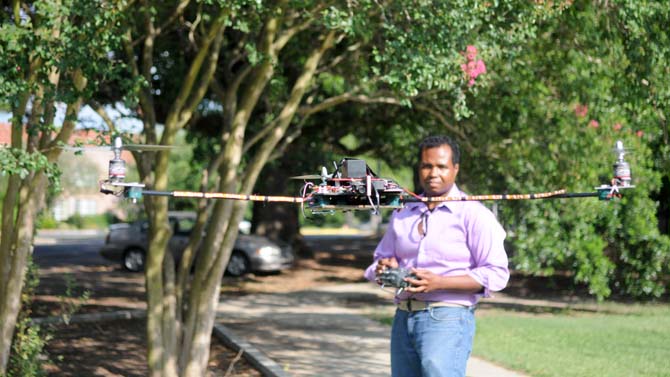University graduate student Charles Malveaux watched intently as a drone circled overhead on the Parade Ground. But the familiar buzzing sound wasn’t that of a government-made Predator Drone — it was his own creation.
While the moral debate over U.S. drone strikes overseas continue, a new argument over domestic drone use and privacy and security has engulfed the country.
Though aware of privacy and security concerns, the biological engineering graduate student sees more practical uses for his drone, ranging from field research to emergency response.
“As a pilot of single-winged aircraft, I’ve always been interested in aerodynamic engineering,” Malveaux said. “I wanted to apply my love for aviation research with civilian applications.”
Malveaux said he recently used the drone to research alligator nests near the state’s intercoastal canal. Though skeptical, Malveaux is not opposed to widespread use of domestic drones.
“As long as drones are used responsibly, I think there’s a place for them,” Malveaux said. “Each individual has to decide the balance between privacy and security, but there’s always going to be a trade-off. Privacy has somewhat gone, anyway.”
His aluminum and carbon fiber tricopter, equipped with GPS and a camera, can accelerate up to speeds of 40 mph and climb to about 400 feet. The $7,000 device also has sonar, infrared and air quality sensors and weighs five pounds when fully equipped.
Photography, meteorology and commercial agriculture are other fields that can benefit from drone technology, Malveaux said.
Malveaux said he’s a supporter of military drone use.
“It can save lives … and it could make the battlefield more efficient,” he said.
Opponents of the military’s drone usage, like English senior Eric Couto, think otherwise.
“That’s crazy that we should strike other countries,” Couto said. “It will definitely offset some chain reaction.”
Couto also acknowledged he is unsure of the domestic drone debate, and isn’t sure which liberty is more expendable: privacy or security.
The Wall Street Journal’s law blog said more than 40 states are in the process of enacting legislation for the use of domestic drones. Louisiana has no legislation on drone use at this time.
As the sole drone researcher in his department, Malveaux said he hopes to keep conducting drone research and possibly partner with other University departments.
“No matter what you do, the technology’s out here already, so we might as well use it for good,” Malveaux said.





